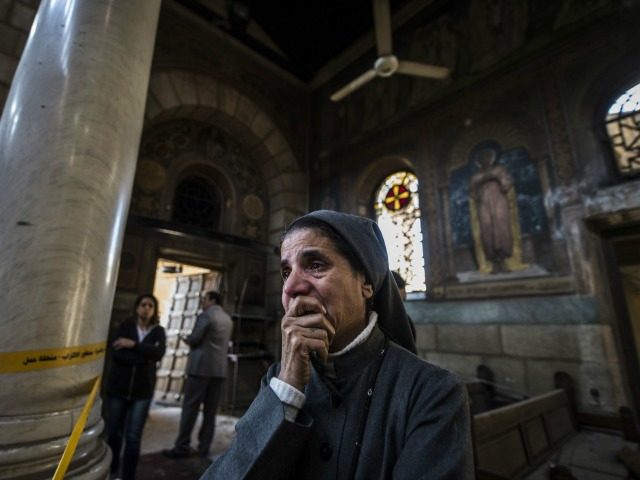CAIRO (AFP) – Egypt’s interior ministry Monday accused fugitive Muslim Brotherhood leaders who have fled to Qatar of training and financing the perpetrators of the bomb attack on a Cairo church that killed 25 people.
It said investigations revealed the group was led by a suspect who received financial and logistical support and instructions to carry out the attacks by Brotherhood leaders residing in Qatar.
The Muslim Brotherhood had denied any involvement with the explosion at the Saint Peter and Saint Paul Church on Sunday.
The incident was the deadliest attack in recent memory on the Christian minority, who make up about 10 percent of Egypt’s population.
In a statement, the interior ministry said investigations showed 22-year-old Mahmoud Shafik Mohamed Mostafa, the suspected suicide bomber, had been arrested in 2014 while securing Muslim Brotherhood convoys while armed. He was released in May the same year.
President Abdel Fattah al-Sisi had named Mostafa as the suicide bomber earlier on Monday, during a funeral held for the victims.
Mostafa was wanted for two other cases in connection with fundamentalist groups, the ministry said in the statement.
DNA testing of body parts found at the scene matched with his family, it said.
During investigations, authorities found two explosive belts ready to be detonated, as well as other materials used to make explosive devices, at a hideout used by Mostafa and his group.
The attack occurred during Sunday service at the church adjacent to Saint Mark’s Cathedral, the seat of Coptic Pope Tawadros II.
There has been no claim of responsibility for the bombing, but Coptic Christians have been previously targeted in Egypt.
– Suspects named –
The interior ministry also named the four other people whom Sisi said had been arrested.
Rami Mohamed Abdel Hameed Abdel Ghani is suspected to have provided refuge for the suicide bomber, preparing him, and hiding the explosives.
The three others are Mohamed Hamdi Abdel Hamid Abdel Ghani, Mohsen Mostafa el-Sayed Qassem, and Ola Hussein Mohamed Ali, a woman.
The detainees will be presented to state security prosecution, while authorities are still chasing others, according to the statement.
It said the group was led by suspect Mohab Mostafa el-Sayed Qassem, also known as “The Doctor”, who travelled to Qatar in 2015 where he met with some Muslim Brotherhood leaders who had fled Egypt.
Qassem was offered financial and logistical support to carry out attacks in Egypt and upon his return, he travelled to North Sinai province, where Islamist insurgents trained him in using weapons and making explosive devices.
When Qassem returned to his home in Cairo, the Brotherhood members residing in Qatar instructed him to start preparing and planning for attacks targeting Copts.
The attacks were “aiming to foment a large-scale sectarian crisis” without linking the group with these attacks, the interior ministry said.
The interior ministry statement claims a group named The Egyptian Revolutionary Council, an alleged arm of the Brotherhood, has issued a statement on December 5 “vowing to target the heads of the Orthodox Church because of its support for the state.”
Sunday’s blast was the worst attack on the Coptic Christian community since a 2011 suicide bombing killed more than 20 worshippers outside a church in the coastal city of Alexandria.
Copts have faced persecution and discrimination dating back to the 30-year rule of Hosni Mubarak, who was toppled by a popular uprising in 2011.
After the 2013 ouster of Muslim Brotherhood president Mohamed Morsi, his Islamist supporters accused the Christian community of supporting his overthrow.
They pointed to the appearance of Tawadros next to Sisi in July 2013, when the then army chief — also surrounded by Muslim and opposition figures — announced Morsi’s removal on television.
Following the deadly dispersal by security forces of two pro-Morsi protest camps in Cairo in August 2013, at least 42 churches were attacked, as well as dozens of schools, houses and businesses belonging to Copts, according to Human Rights Watch.

COMMENTS
Please let us know if you're having issues with commenting.